On December 19, 2023, on the occasion of the third council of the fifth session of the China National Textile and Apparel Council and the 2023 China Textile Conference, the China National Textile and Apparel Council held the China Fashion Industry ESG Governance Summit in Wuhan.
As a carrier of cultural and creative industries, the fashion industry is not only related to economic development, but also the direction and coordination of social progress. In the context of globalization, ESG environmental and social governance has become an important standard for measuring the sustainable development of enterprises. This summit brings together industry elites, academic authorities, business leaders, and policymakers to discuss and exchange best practices and future trends in ESG governance in the fashion industry.
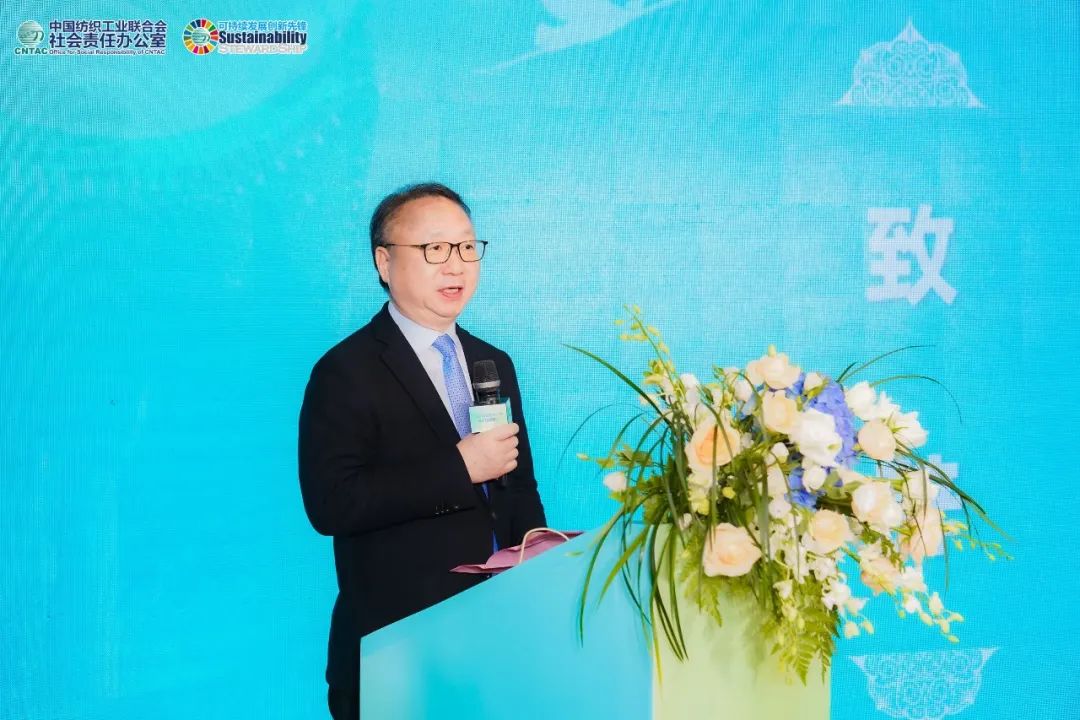
Sun Ruizhe, President of the China National Textile And Apparel Council, stated that as an industry with global advantages, the social responsibility construction of China's fashion industry has always been in a leading position and at the forefront of the times. As China Textile is undergoing the world's largest transformation towards fashion intelligence, greenery, and high-end, ESG is an important method and tool to enhance industry and corporate responsibility governance capabilities. In the future, the China Textile Federation will gradually promote the integration of ESG concepts into industry genes in three aspects. The first is to enhance awareness and establish a global perspective. Strengthen social communication and market guidance, and enhance the volume and value impact of ESG-related work. Promote the integration of ESG into the entire process of enterprise strategy and production operations and transform it into an endogenous driving force for high-quality development. Guide establishing a corporate culture, business model, and discourse system that includes ESG content. Make ESG concepts a value pursuit and industry language, and promote ESG practices as industry trends and corporate consciousness. The second is to build a system and form a leading and normative force. Based on reality, standards must be standards and continuous improvement must be made to the industry's ESG information disclosure system, ESG performance evaluation system, and ESG capability enhancement system. Support industry enterprises in establishing an ESG work closed-loop system of "information disclosure performance evaluation capability improvement information disclosure" and jointly build a good industry ESG work ecosystem with stakeholders. Strengthen the mechanisms of "transparency," "integrity," "openness," and "diversity" to prevent "greenwashing" behavior. The third is to promote implementation and maintain rhythm and effectiveness. Cultivate enterprises with a full supply chain ESG management system and capabilities in a hierarchical and step-by-step manner, led by leading and industry-listed enterprises, gradually driving the development of the entire industry chain. Tell the industry story well, guide investment towards enterprises and projects with good ESG performance, optimize industry capital allocation, and promote industry value transformation.
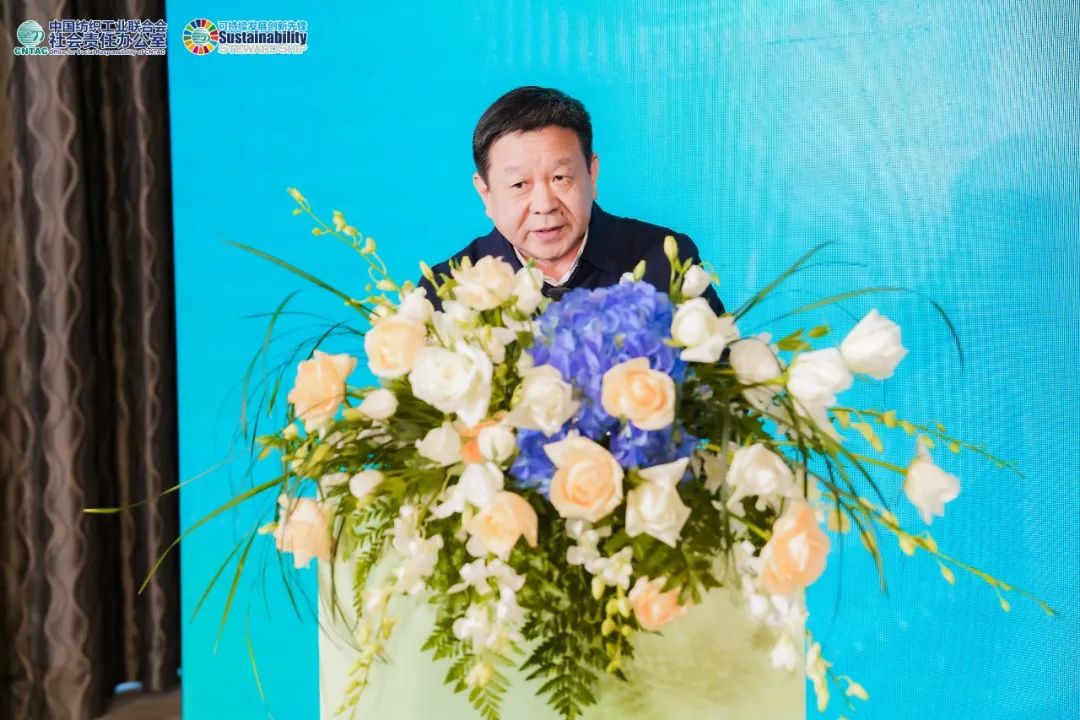
Meng Chunlin, a first-level inspector of the Hubei Provincial Department of Economy and Information Technology, attended the summit and delivered a speech. He stated that the textile and clothing industry is a traditional pillar industry in Hubei Province. In recent years, the Hubei Provincial Party Committee and Government have attached great importance to developing the textile and clothing industry. In 2022, the textile and clothing industry in Hubei Province had 1651 large-scale enterprises, achieving a revenue of 335.86 billion yuan, ranking fifth in the country. Since the beginning of this year, Hubei Province has listed the modern clothing industry as one of the nine emerging characteristic industrial chains and has issued a three-year action plan for the high-quality development of the textile and clothing industry in Hubei Province, with technology, fashion, and green as the development direction. Hubei Province will take this summit as an opportunity to seize new trends and transform ideas and concepts on ESG governance in the fashion industry into new ideas and tracks for Hubei's industrial development.
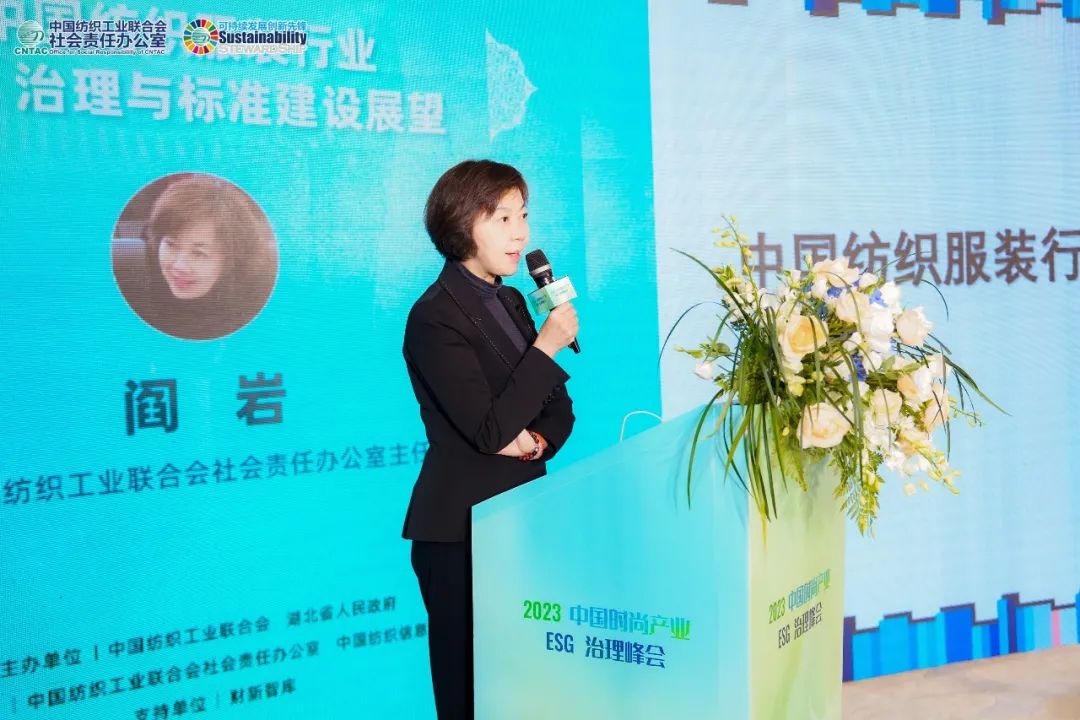
Yan Yan, Vice President of the China National Textile and Apparel Council and Director of the Office for Social Responsibility of CNTAC, has put forward his insights from a local perspective on the theme of ESG governance and standard construction in the Chinese textile and clothing industry. She stated that the importance of promoting ESG governance in the industry lies in four aspects. Firstly, the top-level design - ESG concept aligns highly with the development strategy of high-quality industry development and building a modern industrial system. The second is trade barriers - the international trade policies of countries such as the European Union and the United States constantly indicate that ESG risks will become an important part of market access assessment. Thirdly, capital shift - ESG has gradually become a new direction for investment activities, and ESG information will provide important support in capital financing; The fourth is consumer transformation - the new generation is gradually becoming the leading consumer group, and the concept of sustainable consumption is prevalent. Sustainable products will be an important carrier for communication between enterprises and consumers.
Specifically, regarding the actions taken by the China National Textile and Apparel Council in ESG governance, the China National Textile and Apparel Council established the Office for Social Responsibility of CNTAC in 2005, the first department to promote corporate social responsibility at the industry level. Since 2006, it has released annual industry social responsibility reports for 18 consecutive years. In 2008, China released its first industry self-discipline social responsibility management system. Develop an industry ESG evaluation system and information disclosure platform in 2022. Moreover, the China National Textile and Apparel Council is currently exploring the development of ESG information disclosure standards for industry enterprises, guiding them to establish an ESG work closed-loop system. This is because the Chinese textile and clothing industry has the characteristics of a large number of small and medium-sized enterprises, a particularly long supply chain, and a wide range of stakeholders. Highlighting substance and enhancing practicality are important considerations that distinguish it from international ESG disclosure standards. In the future, China National Textile And Apparel Council will use this as a starting point to promote industry enterprises to establish a closed-loop work system for information disclosure and ESG management.
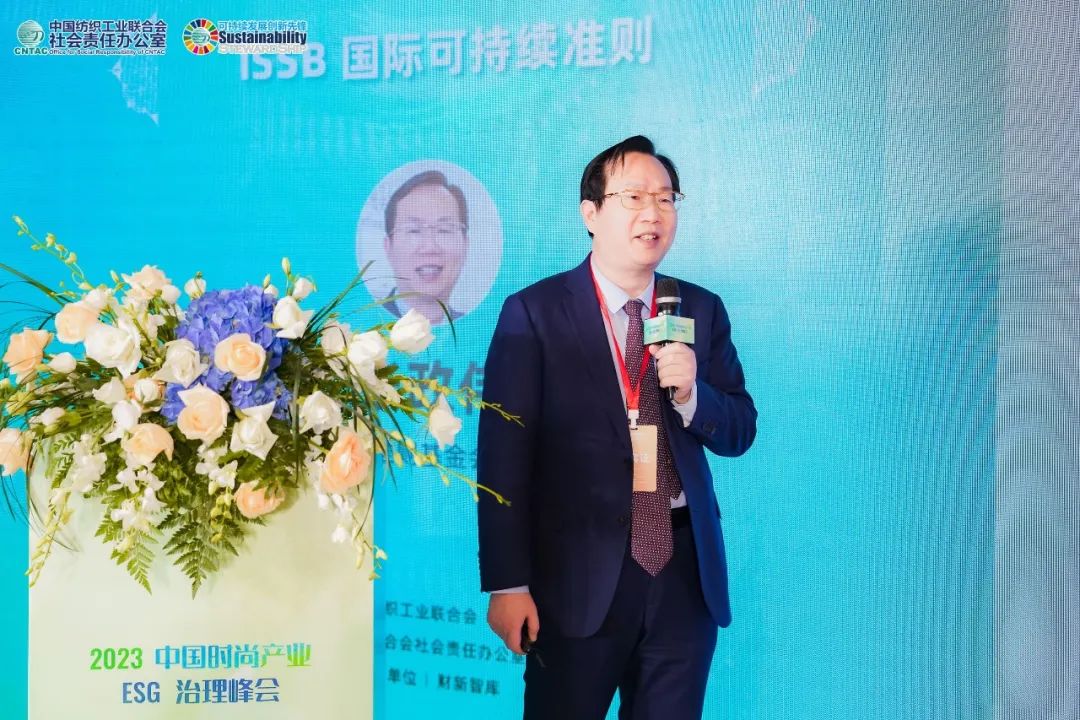
As a representative of the standard setters, Zhang Zhengwei, Director of the Beijing Office of the ISSB International Sustainable Standards Foundation, put forward his thoughts on ESG governance in the fashion industry. Without good information, there can’t be any effective measurement and no good decisions. Traditional financial reports only provide 5% of the information in investor decision-making, with up to 95% of the information being non-financial. Zhang Zhengwei emphasized that enhancing the effectiveness, comparability, and reliability of information and creating Mandarin as a global ESG standard language is the original intention and ambition of ISSB. Specifically, when it comes to how to get enterprises to start using standards and implementing ESG management, he believes that the core element is for enterprises to enhance their sense of ownership, not to shirk or hesitate, to liberate their minds from the top-down, and to work together with upstream and downstream industries in the industry chain.
The conference also invited representatives of outstanding companies in the industry to share their ESG governance experience.
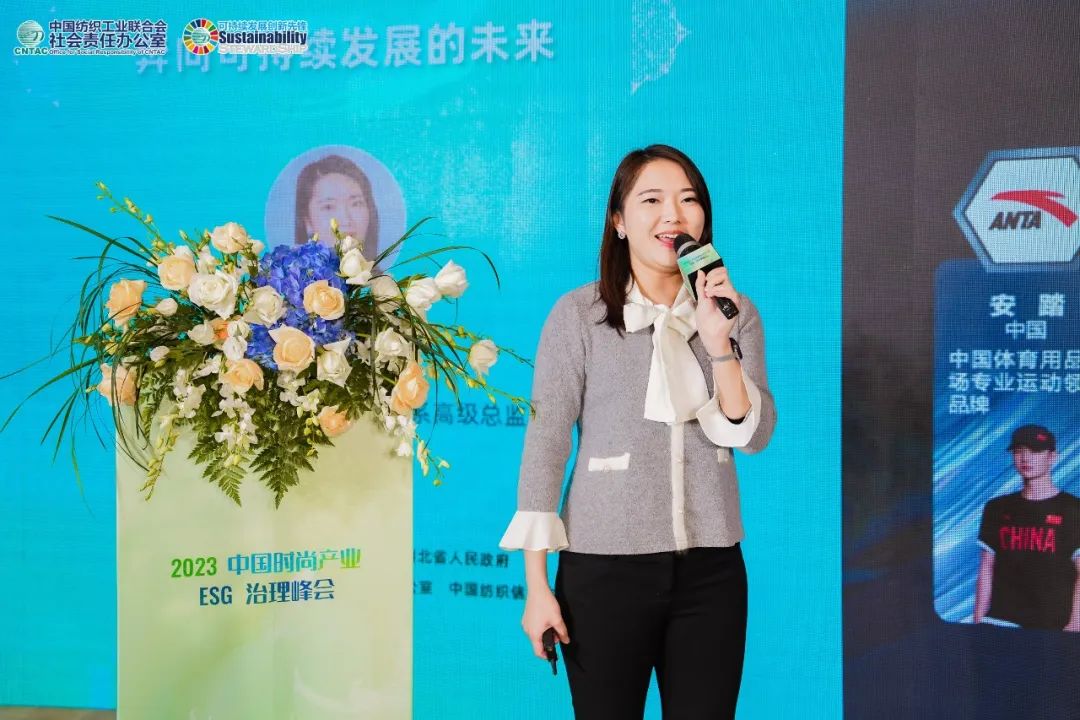
As a representative of the brand enterprise, Huang Cuiqi, Senior Director of ESG and Investment Relations at ANTA Group, stated that ANTA has been required to disclose CSR reports by the Hong Kong Stock Exchange since 2007. Starting in 2016, Anta was the first Chinese sports equipment company to release ESG reports. On the occasion of Anta's 30th anniversary in 2021, a Sustainable Development Committee was established internally to promote ESG work from top to bottom. "Coexistence with partners" is the core concept of Anta's integration of ESG into the company's strategy. After conducting important research, ANTA has focused on five aspects: "consumers," "people," "partners," "employees," and "supplier partners," and has set goals and implemented them separately. For example, the company has set a climate target for carbon neutrality by 2050, and by the end of this year, the proportion of female executives has exceeded 36%. Training on supplier environmental and social aspects has been conducted, and the proportion of sustainable raw materials has been disclosed on packaging and hang tags.
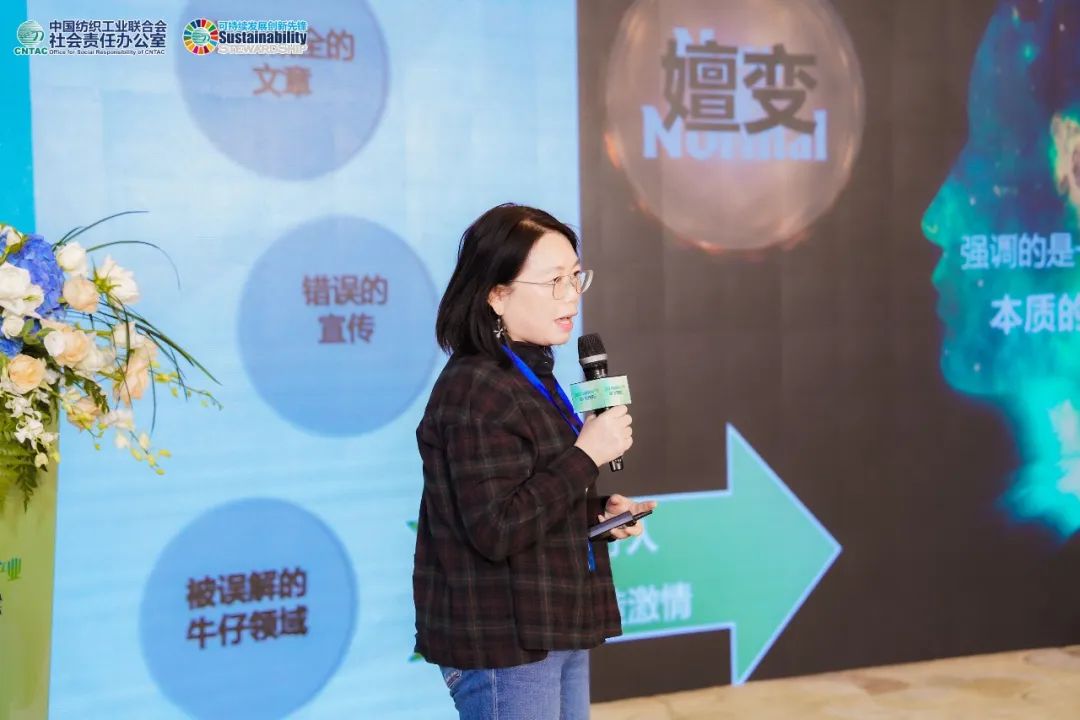
Wang Zongwen, CEO of Forward Cowboy, shared her experience as a representative of manufacturing enterprises. She stated that after years of technological development, the denim industry has shed the label of high water consumption and pollution and has the potential to become one of the most environmentally friendly fabrics. This is mainly due to its characteristics of bio-based raw materials, short process manufacturing, fewer chemicals, room temperature dyeing, water washing techno logy transformation, and less microfiber washing. When it comes to enterprise ESG management experience, she mentioned that in recent years, Forward Cowboy has mainly made efforts in sustainable procurement, equipment development, product research and development, energy management, waste management, and intelligent transformation, such as continuously improving the proportion of sustainable fiber usage, using environmentally friendly dyeing equipment, implementing 54 technological transformation activities, achieving an annual cycle of 460000 tons of water, and using digital twin technology to achieve real-time tracking of workshop water and electrical data.
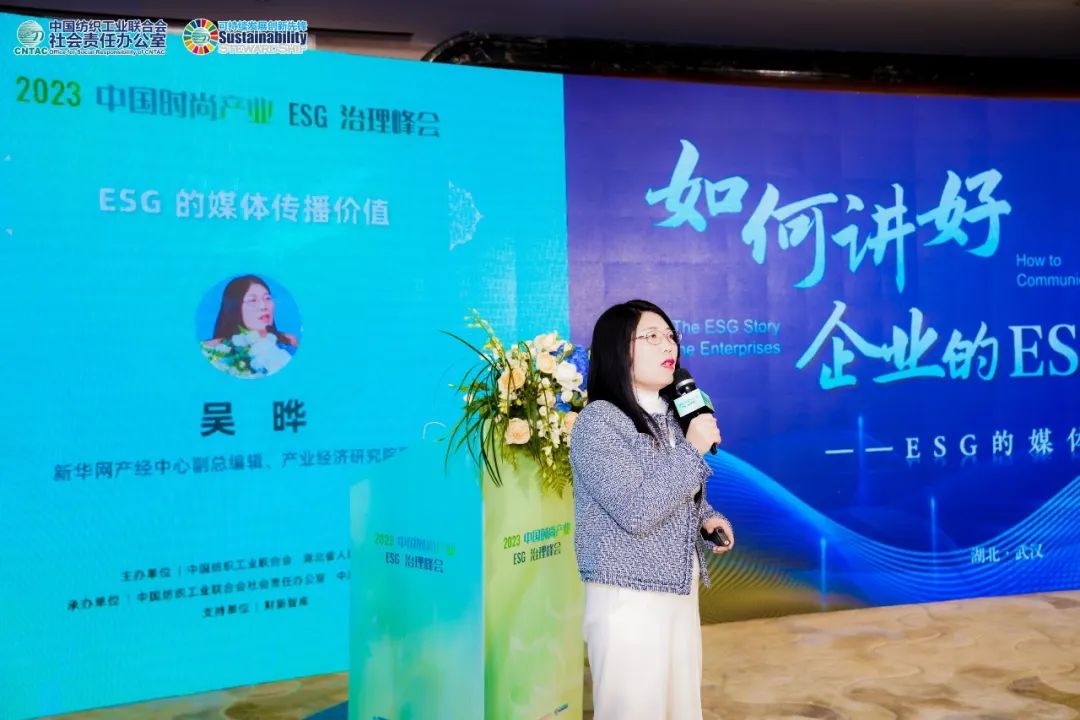
As a media representative, Wu Ye, Deputy Editor in Chief of the Industry and Economics Center of Xinhua News Agency and President of the Industrial Economics Research Institute, shared the theme of how enterprises can tell ESG stories well. She stated that ESG emphasizes the concepts of data rationality, scientific systems, and standardized logic. From a communication perspective, translating it into a storytelling ESG narrative that is easy for the public to understand, supplemented by diverse forms of communication and media channels, can reach more stakeholders. This requires companies to start with three strategies: strengthening information disclosure, brand image dissemination, and prioritizing public relations. They should use consensus, empathy, and resonance as communication methods, adhere to the logic of youthfulness, attach importance to cases and stories, strengthen their ability to respond to public opinion, and establish long-term communication mechanisms and platforms with stakeholders.
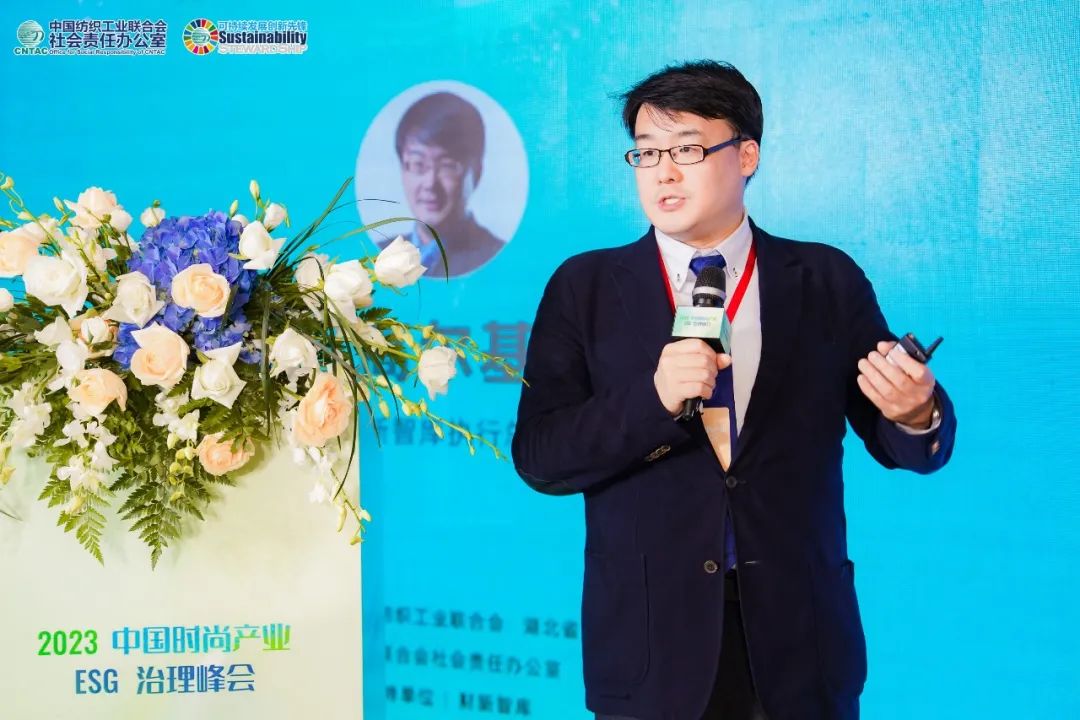
Gao Erji, CEO of Caixin Think Tank, gave a presentation on "ESG Development in the Digital Economy Era." He put forward a point of view that the Chinese path to modernization emphasizes high-quality development, while "high-quality development=new economy+ESG." Traditionally, the new economy is more technology-enabled, while the development of the digital economy ushers in new growth opportunities for a large number of secondary industries. ESG plays two major roles in promoting sustainability goals from capital market to enterprise strategy and surpassing green economy. In recent years, Caixin Think Tank has been focusing on this theme in two directions: first, promoting the localization of ESG and enterprise ESG work around multiple stakeholders; second, using AI and big data to help the government iterate industrial governance. In the future, Caixin Think Tank will continue to leverage the digital economy to leverage more ESG capital and help businesses develop in the long term.
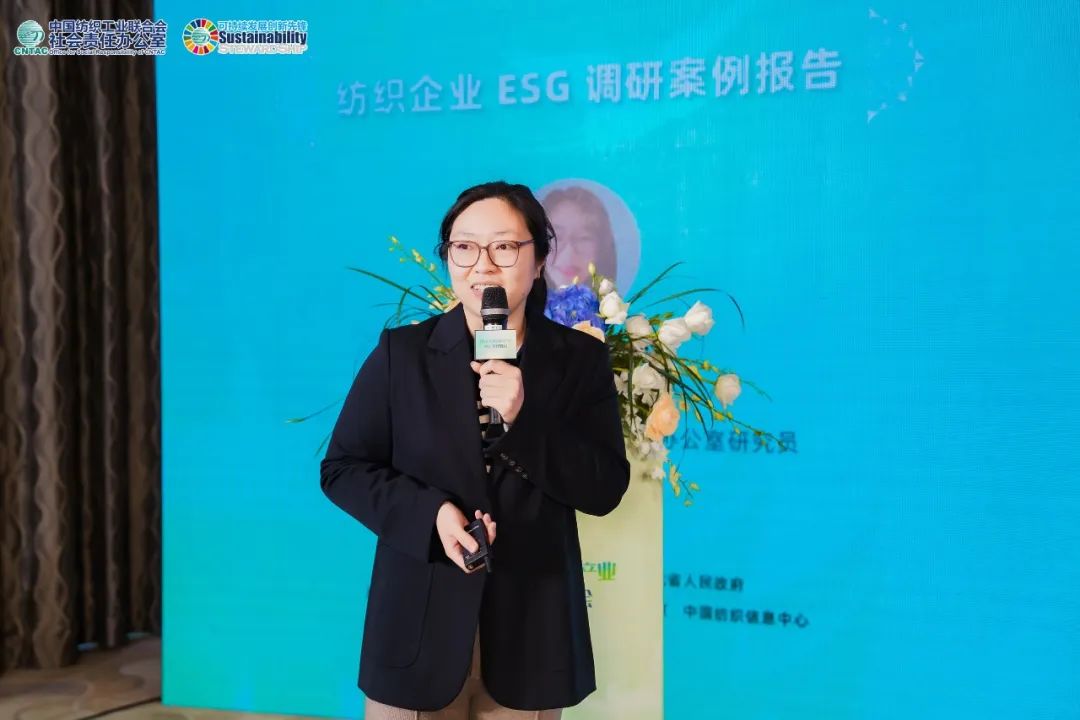
Wang Jing, a researcher at the Office for Social Responsibility of CNTAC, shared the results of the 2022 ESG performance evaluation of the textile industry with the topic of "ESG Research Case Report of Textile Enterprises." Listed companies (especially those listed in Hong Kong) generally performed outstandingly, and most of them scored high in governance, largely due to the mandatory disclosure requirements of the exchange. The disclosed information is more generalized and conservative in a more autonomous environment and social level. In addition, the assessment also found that the integration of ESG into corporate strategy and executive consensus is poor, and in the face of increasingly severe international supply chain risks, how to transfer ESG values from the company itself to the supply chain will be a necessary issue. She stated that as an industry organization, the China National Textile and Apparel Council hopes to combine the characteristics of the industry with the continuous emergence of international standards, localize imported products, reduce the burden of corporate disclosure, enhance corporate disclosure and management capabilities, and form a sound work system of "promoting management through investment, and promoting investment through management."
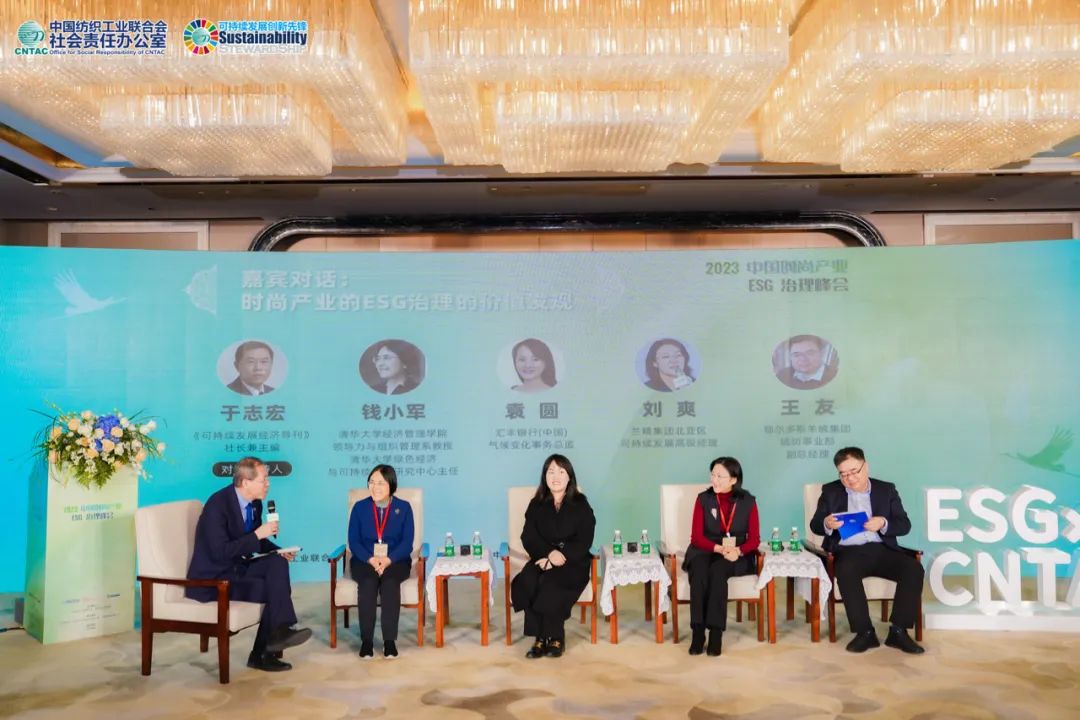 
In addition to content sharing, the conference also set up a guest dialogue segment hosted by Yu Zhihong, the President and Editor in Chief of the Sustainable Development Economic Guide, inviting Qian Xiaojun, a Professor of Leadership and Organizational Management at the School of Economics and Management of Tsinghua University, Director of the Green Economy and Sustainable Development Research Center at Tsinghua University, Yuan Yuan, Director of Climate Change Affairs at HSBC (China), and Liu Shuang, Senior Manager of Sustainable Development in North Asia of Lanjing Group Wang You, Deputy General Manager of the Cashmere Textile Affairs Department of Ordos Cashmere Group, is discussing the value discovery of ESG governance in the fashion industry.
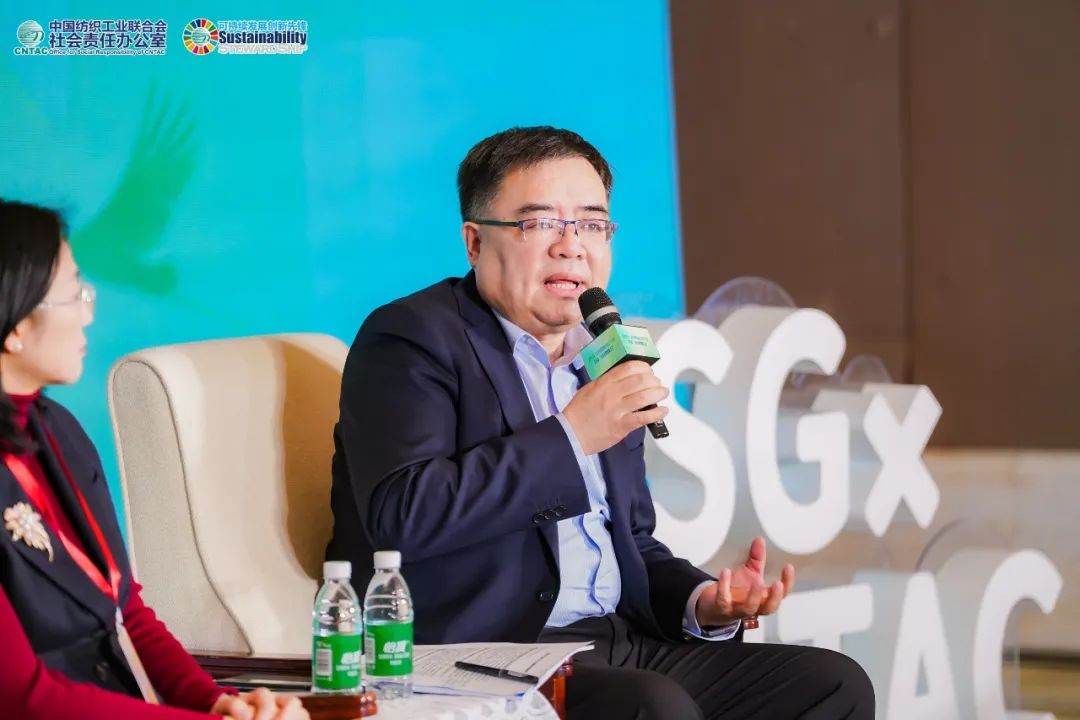
Wang You stated that as a cashmere-focused enterprise, Erdos has been carrying out sustainable related work around themes such as grassland degradation, desertification prevention and control, and animal welfare since the 1990s. In 2017, Erdos incorporated sustainable development into the group's development strategic vision and will be committed to building a world-class cashmere industry. In recent years, the ESG concept has been deeply integrated into industrial chain management, with a focus on sustainable development throughout the entire process from ranching to the market, to create a responsible cashmere product that is source-certified, environmentally friendly in production, and guaranteed in quality.
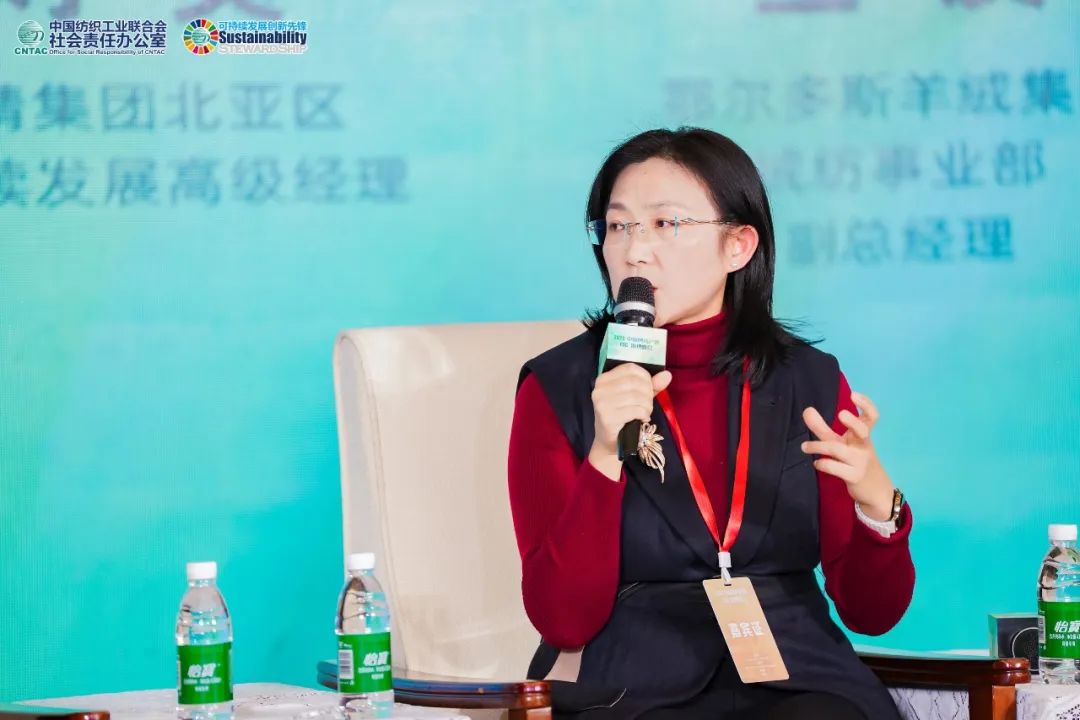
Liu Shuang mentioned that Lanjing considers "benefiting nature" to be the sustainable development concept of the group and makes efforts in raw material selection, product ecological design, factory site selection, energy utilization, and other aspects. Following the concept of "cooperation to promote change," Lanjing works with stakeholders to create a green value chain and achieve systematic change. For example, the Austrian factory has achieved zero carbon factory standards by using biomass energy and green electricity without any compensation and by implementing the coal-to-gas project at the Nanjing factory.
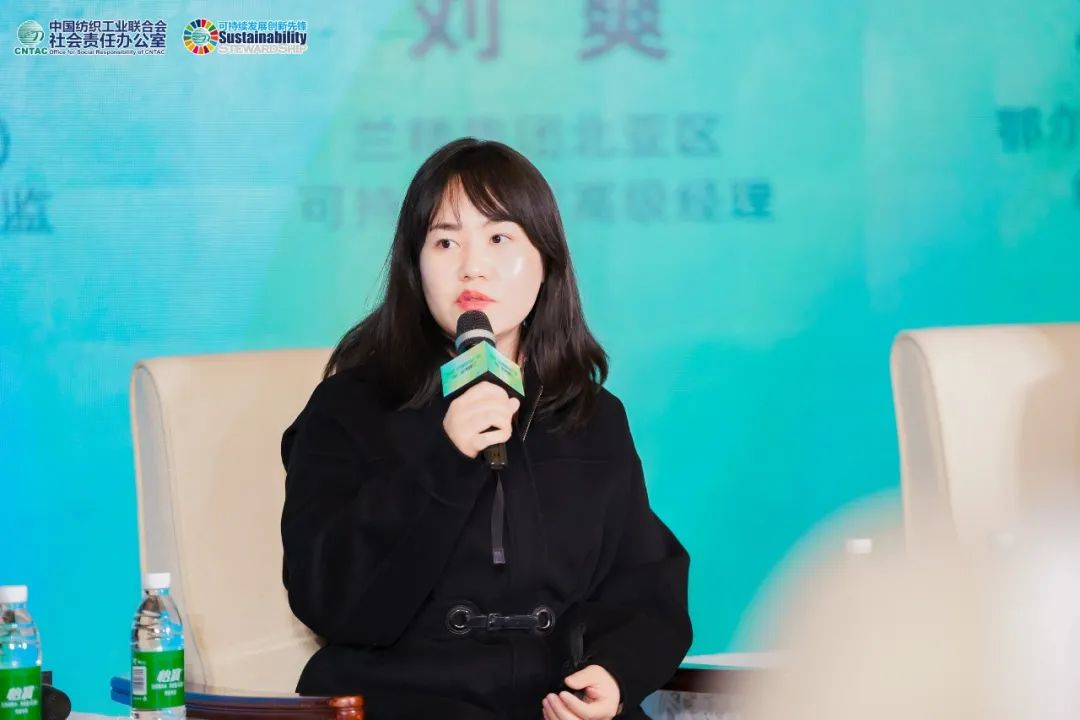
As a representative of financial institutions, Yuan Yuan emphasized that the capital market highly values the impact of ESG on finance, and substance is the key to it. Current ESG disclosure generally focuses on "past behavior," while capital focuses on "forward prediction," emphasizing risk resilience and governance strategies. Companies typically underestimate these two aspects.
When discussing the relationship between ESG and corporate governance, Qian Xiaojun stated that ESG is not an independent business line but a business philosophy. It is necessary to establish an effective top-down governance mechanism, integrate substantive issues into daily management, have goals and assessments, and, on this basis, ESG should be integrated into the corporate culture on this basis in order to implement ESG strategies from the inside out. She emphasized that ESG will be survival-oriented in the future, and enterprises should have a sense of crisis and create a first-mover advantage.
From product and production capacity going global to brand and capital going global, the industry’s development reflects a high level of openness and the value pursuit and strategic direction of "people-oriented" and "common prosperity". The construction of ESG in the fashion industry is a long-term and systematic project. The great road is not alone, and everyone's actions go far. We look forward to providing practical guidance for the fashion industry and sustainable development in China and even globally through this summit forum. |
